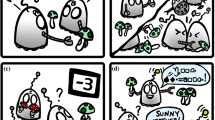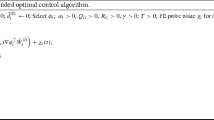Abstract
This paper proposes a networked control architecture that provides robustness not only to parametric uncertainties in the model but also to packet dropouts and time-varying network-induced delays. Contrary to the common approach of nonlinear optimization solvers, the estimation and control approaches stand out by providing a direct solution derived from an Extended Kalman Filter and a Recursive Robust Linear-Quadratic Regulator. Moreover, we prove that the optimal robust solution for a single agent suffices for the control of a homogeneous multi-agent scenario. Numerous simulations analyze the impact of different network conditions on the proposed architecture for a multi-agent scenario. Finally, the architecture was implemented and made available as a Robot Operating System (ROS) package, and trajectory-tracking missions were experimentally carried out to show the effectiveness of the proposed system.
Similar content being viewed by others
Availability of data and material
Not applicable.
Code Availability
Not applicable.
References
Klügel, M., et al.: Joint cross-layer optimization in real-time networked control systems. IEEE Trans. Control. Netw. Syst. 7(4), 1903–1915 (2020). https://doi.org/10.1109/TCNS.2020.3011847
Outeiro, P., Cardeira, C., Oliveira, P.: Multiple-model adaptive control architecture for a quadrotor with constant unknown mass and inertia. Aerosp. Sci. Technol. 117, 106899 (2021). https://doi.org/10.1016/j.ast.2021.106899
Cheng, P., Wang, H., Stojanovic, V., Liu, F., He, S., Shi, K.: Dissipativity-based finite-time asynchronous output feedback control for wind turbine system via a hidden Markov model. Meas. Sci. Technol. 33, 115005 (2022). https://doi.org/10.1080/00207721.2022.2076171
Tao, H., Cheng, L., Qiu, J., Stojanovic, V.: Few shot cross equipment fault diagnosis method based on parameter optimization and feature metric. Int. J. Syst. Sci. 53, 3177–3189 (2022). https://doi.org/10.1088/1361-6501/ac8368
Tan, C., Li, L., Zhang, H.: Stabilization of networked control systems with both network-induced delay and packet dropout. Automatica 59, 194–199 (2015). https://doi.org/10.1016/j.automatica.2015.06.026
Ríos, H., Falcón, R., González, O.A., Dzul, A.: Continuous sliding-mode control strategies for quadrotor robust tracking: real-time application. IEEE Trans. Ind. Electron. 66(2), 1264–1272 (2019). https://doi.org/10.1109/TIE.2018.2831191
Mahmood, A., Kim, Y.: Decentralized formation flight control of quadcopters using robust feedback linearization. J. Frankl. Inst. 354(2), 852–871 (2017). https://doi.org/10.1016/j.jfranklin.2016.10.039
Khanesar, M.A., Kaynak, O., Yin, S., Gao, H.: Adaptive indirect fuzzy sliding mode controller for networked control systems subject to time-varying network-induced time delay. IEEE Trans. Fuzzy Syst. 23(1), 205–214 (2015). https://doi.org/10.1109/TFUZZ.2014.2362549
Jasim, W., Gu, D.: Robust team formation control for quadrotors. IEEE Trans. Control Syst. Technol. 26(4), 1516–1523 (2018). https://doi.org/10.1109/TCST.2017.2705072
Santoso, F., Garratt, M.A., Anavatti, S.G.: Fuzzy logic-based self-tuning autopilots for trajectory tracking of a low-cost quadcopter: a comparative study. 2015 Int. Conf. Adv. Mechatron. Intell. Manuf. Ind. Autom (ICAMIMIA). 64–69 (2015). https://doi.org/10.1109/ICAMIMIA.2015.7508004
Duggal, V., Sukhwani, M., Bipin, K., Reddy, G.S., Krishna, K.M.: Plantation monitoring and yield estimation using autonomous quadcopter for precision agriculture. 2016 IEEE Int. Conf. Robot. Autom (ICRA). 5121-5127 (2016). https://doi.org/10.1109/ICRA.2016.7487716
Park, M.-C., et al.: Realization of distributed formation flying using a group of autonomous quadcopters and application to visual performance show. 2016 IEEE Transp. Electrification Conf. Expo, Asia-Pacific (ITEC Asia-Pacific), 877–882 (2016). https://doi.org/10.1109/ITEC-AP.2016.7513074
Kim, J., Gadsden, S.A., Wilkerson, S.A.: A comprehensive survey of control strategies for autonomous quadrotors. Can. J. Electr. Comput. Eng. 43(1), 3–16 (2020). https://doi.org/10.1109/CJECE.2019.2920938
Beloti Pizetta, I.H., Santos Brandão, A., Sarcinelli-Filho, M.: Cooperative quadrotors carrying a suspended load. 2016 Int. Conf. Unmanned Aircraft Systems (ICUAS), 1049–1055 (2016). https://doi.org/10.1109/ICUAS.2016.7502605
Liu, J., Xu, W., Guo, B., Zhou, G., Zhu, H.: Accurate mapping method for UAV photogrammetry without ground control points in the map projection frame. IEEE Trans. Geosci. Remote Sens. 59(11), 9673–9681 (2021). https://doi.org/10.1109/TGRS.2021.3052466
Diehl, M., Ferreau, H.J., Haverbeke, N.: Efficient numerical methods for nonlinear MPC and moving horizon estimation. Nonlinear model predictive control: towards new challenging applications. Ed. Springer pp. 391–417 (2009)
Simon, D.: Optimal state estimation: Kalman, \(\cal H\it _{\infty }\), and nonlinear approaches. Plastics, 1st ed., Wiley-Interscience (2006)
Philipp, P.: Centralized and distributed moving horizon strategies for state estimation of networked control systems. Ph.D. Dissertation, Technical University of Munich, Germany, (2013)
Xiaoning, Z.: Analysis of military application of UAV swarm technology. In: 2020 3rd International Conference on Unmanned Systems (ICUS), pp. 1200–1204 (2020)
Cerri, J.P., Terra, M.H., Ishihara, J.Y.: Recursive robust regulator for discrete-time state-space systems. 2009 Am. Control Conf. 3077–3082 (2009). https://doi.org/10.1109/ACC.2009.5160553
Liu, G.-P.: Design and analysis of networked non-linear predictive control systems. Control Theory Appl. IET 9(11), 1740–1745 (2015)
Liu, H., Zhu, Q., Jiang, J., Wang, Y., Yang, H.: Guaranteed cost control of networked control systems with long time delay. 2008 IEEE Pacific-Asia Workshop Comput Intell. Ind. Appl. 175–179 (2008). https://doi.org/10.1109/PACIIA.2008.172
Postoyan, R., van de Wouw, N., Nešić, D., Heemels, W.P.M.H.: Tracking control for nonlinear networked control systems. IEEE Trans. Autom. Control 59(6), 1539–1554 (2014). https://doi.org/10.1109/TAC.2014.2308598
Rahmani, B., Markazi, A.H.D.: Variable selective control method for networked control systems. IEEE Trans. Control Syst. Technol. 21(3), 975–982 (2013). https://doi.org/10.1109/TCST.2012.2194739
Takahashi, N., Yokomichi, M., Sato, O.: Guaranteed cost control of the networked control system. 2014 Proc. SICE Annu. Conf. (SICE), 626–631 (2014). https://doi.org/10.1109/SICE.2014.6935213
Terra, M.H., Cerri, J.P., Ishihara, J.Y.: Optimal robust linear quadratic regulator for systems subject to uncertainties. IEEE Trans. Autom. Control 59(9), 2586–2591 (2014). https://doi.org/10.1109/TAC.2014.2309282
Xia, Y., Liu, G.P., Rees, D.: \(\cal H\it _{\infty }\) control for networked control systems in presence of random network delay and data dropout. In: Chinese Control Conference, pp. 2030–2034 (2006)
Sarangapani, J., Xu, H.: Optimal networked control systems with MATLAB. CRC Press, FL, USA (2015)
Bergamasco, M., Lovera, M.: Identification of linear models for the dynamics of a hovering quadrotor. IEEE Trans. Control Syst. Technol. 22(5), 1696–1707 (2014). https://doi.org/10.1109/TCST.2014.2299555
Schreier, M.: Modeling and adaptive control of a quadrotor. 2012 IEEE Int. Conf. Mechatron. Autom. 383–390. (2012). https://doi.org/10.1109/ICMA.2012.6282874
Holtsov, A.S., Farhadi, R.M., Kortunov, V.I., Mohammadi, A.: Comparison of the UAV adaptive control with the robust control based on mu-synthesis. 2016 4th International Conference on Methods and Systems of Navigation and Motion Control (MSNMC), pp. 18–21 (2016). https://doi.org/10.1109/MSNMC.2016.7783096
Kim, J., Kang, M.-S., Park, S.: Accurate modeling and robust hovering control for a quadrotor VTOL aircraft. J Intell. Robot. Syst. 57(1), 9–26 (2009). ISSN 1573-0409
Benevides, J.R.S., Inoue, R.S., Paiva, M.A.D., Terra, M.H.: ROS-Based robust and recursive optimal control of commercial quadrotors. 2019 IEEE 15th Int. Conf. Autom. Sci. Eng. (CASE), 998–1003 (2019). https://doi.org/10.1109/COASE.2019.8843004
Funding
This work has been supported by the following Brazilian research agencies: São Paulo Research Foundation (FAPESP) (#2017/05668-0 and #2014/50851-0), and by Brazilian National Council for Scientific and Technological Development (CNPq) (#465755/2014-3, #421131/2018-7), and by Coordenação de Aperfeiçoamento de Pessoal de Nível Superior - Brazil (CAPES) - Finance Code 001
Author information
Authors and Affiliations
Contributions
All authors contributed to the study, conception, and design. Coding, filtering design, and data processing were performed by D.Sc. João R. S. Benevides. The first draft of the manuscript was written by D.Sc. João R. S. Benevides, and all authors, have assisted in editing the manuscript. All authors read and approved the final manuscript.
Corresponding author
Ethics declarations
Ethics approval
Not applicable.
Consent to participate
Not applicable.
Consent for publication
Not applicable.
Conflicts of interest
The authors declare that they have no conflict of interest.
Additional information
Publisher's Note
Springer Nature remains neutral with regard to jurisdictional claims in published maps and institutional affiliations.
Rights and permissions
Springer Nature or its licensor (e.g. a society or other partner) holds exclusive rights to this article under a publishing agreement with the author(s) or other rightsholder(s); author self-archiving of the accepted manuscript version of this article is solely governed by the terms of such publishing agreement and applicable law.
About this article
Cite this article
Benevides, J., Inoue, R. & Terra, M. Robust LQR-Based Architecture for Faulty Networked Control Systems. J Intell Robot Syst 109, 88 (2023). https://doi.org/10.1007/s10846-023-02017-8
Received:
Accepted:
Published:
DOI: https://doi.org/10.1007/s10846-023-02017-8




